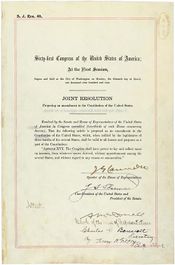Fourth Amendment
 From Conservapedia
From Conservapedia The Fourth Amendment to the United States Constitution states:
| “ | The right of the people to be secure in their persons, houses, papers, and effects, against unreasonable searches and seizures, shall not be violated, and no warrants shall issue, but upon probable cause, supported by oath or affirmation, and particularly describing the place to be searched, and the persons or things to be seized. | ” |
There are two competing views of the Fourth Amendment. The minority view, championed by Justice Antonin Scalia and his replacement Neil Gorsuch, is grounded in pre-American English law and holds that the Fourth Amendment is based in the protection of private property. The other view, held by the vast majority of the U.S. Supreme Court, is that the Fourth Amendment protects reasonable expectations of privacy.
Contents
Supreme Court Rules Police Can Violate The 4th Amendment (If They Are Ignorant Of The Law)[edit]
"U.S. Supreme Court Rules 8-1 that Citizens Have No Protection Against Fourth Amendment Violations by Police Officers Ignorant of the Law"
"In a blow to the constitutional rights of citizens, the U.S. Supreme Court ruled 8-1 in Heien v. State of North Carolina that police officers are permitted to violate American citizens’ Fourth Amendment rights if the violation results from a “reasonable” mistake about the law on the part of police. Acting contrary to the venerable principle that “ignorance of the law is no excuse,” the Court ruled that evidence obtained by police during a traffic stop that was not legally justified can be used to prosecute the person if police were reasonably mistaken that the person had violated the law. The Rutherford Institute had asked the U.S. Supreme Court to hold law enforcement officials accountable to knowing and abiding by the rule of law. Justice Sonia Sotomayor, the Court's lone dissenter, warned that the court's ruling “means further eroding the Fourth Amendment’s protection of civil liberties in a context where that protection has already been worn down.”
“By refusing to hold police accountable to knowing and abiding by the rule of law, the Supreme Court has given government officials a green light to routinely violate the law,” said John W. Whitehead, president of The Rutherford Institute and author of the award-winning book A Government of Wolves : The Emerging American Police State. “This case may have started out with an improper traffic stop, but where it will end — given the turbulence of our age, with its police overreach, military training drills on American soil, domestic surveillance, SWAT team raids, asset forfeiture, wrongful convictions, and corporate corruption — is not hard to predict. This ruling is what I would call a one-way, nonrefundable ticket to the police state.”[1]
Amendments to the Constitution of the United States of America Bill of Rights:
1 - Freedom of speech, press, religion, etc.
2 - Right to bear arms
3 - Quartering of soldiers
4 - Warrants
5 - Due process
6 - Right to a speedy trial
7 - Right by trial of a jury
8 - No cruel or unusual punishments
9 - Unenumerated rights
10 - Power to the people and states
11 - Immunity of states to foreign suits
12 - Revision of presidential election procedures
13 - Abolition of slavery
14 - Citizenship
15 - Racial suffrage
16 - Federal income tax
17 - Direct election of the United States Senate
18 - Prohibition of alcohol
19 - Women's suffrage
20 - Terms of the presidency
21 - Repeal of Eighteenth Amendment
22 - Limits the president to two terms
23 - District of Columbia Voting for President
24 - Prohibition of poll taxes
25 - Presidential disabilities
26 - Voting age lowered to 18
27 - Variance of congressional compensation
See also[edit]
- Surveillance
- Bill of Rights
- Oath Keepers
- Fourth Amendment
- Oath for federal officials
- Oath for federal judges
- Police states-Nanny states violate the United States Constitution-Bill of Rights (especially Second Amendment and Fourth Amendment) and Citizen's Unalienable rights
External links[edit]
References[edit]
- ↑ Supreme Court Rules Police Can Violate The 4th Amendment (If They Are Ignorant Of The Law) Accessed December 31, 2014
Categories: [United States Constitution] [Police State] [Fourth Amendment] [Bill of Rights] [Privacy] [Conservatism] [Libertarianism] [United States History]
↧ Download as ZWI file | Last modified: 02/11/2023 04:29:48 | 137 views
☰ Source: https://www.conservapedia.com/Fourth_Amendment | License: CC BY-SA 3.0
 ZWI signed:
ZWI signed:
 KSF
KSF